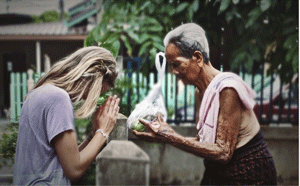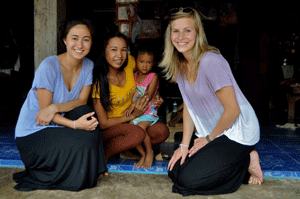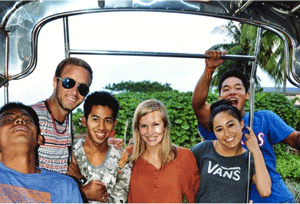Why did you decide to enroll with Rustic Pathways in Thailand?

Quinn: I chose the program in Thailand because my future college roommate, Marina Mendes, was already enrolled. She asked me to come with her, as a bonding experience.
I thought for sure my parents would say no, and they were "considering it" for so long, I almost gave up hope. When they said yes, I couldn't believe it. There was a lot of jumping up and down.
Do you feel like you made a significant impact on the local community? Why or why not?
Quinn: I do feel like we have a significant impact. The programs are structured to fit the individual community, rather than being originated elsewhere, and then forced onto it.
You really see the difference your work makes because you work so closely with individuals from the city. Specifically in the "Meals on Flip Flops" program, our aid was evident.
These people were blind, very old, missing limbs, and without children to take care of them. They had no way to work, and no way to get food. Even providing a single meal for these people felt so good.
What was the most interesting cultural difference you encountered?

Quinn: Women must dress very conservatively there and be careful not to touch the monks or clean the Buddha statues.
It is easy to forget gender inequalities exist while living in America, and that cultural difference was especially pronounced in my mind.
I also noticed how excited the kids there were to be at school. In America, I find that most people I know are complaining about the assignment or the teacher or anything they can think of.
In Thailand, however, the kids were almost over-enthusiastic about learning English. One boy even ran straight into the board while we were playing a relay game because he was so into it. This made me realize how lucky we are to have an easily-accessible education system.
Tell me about one person you met.

Quinn: I met Alex, who is a western staff member. He led through quiet leadership and example.
I admired his cool attitude and genuinely giving heart. He taught me that the road you are expected to take isn't always the best one.
This is a little outside of the reach of the question, but I really loved all of the Burmese staff. They went out of their way to make you feel cared about and loved.
One morning, I asked one of the Burmese staff for condensed milk to put in my tea. He said he would go get some for me.
I assumed he was just going to the kitchen or fridge. He came back a half hour later having bought me 3 cans from the grocery store.
What was the hardest or most challenging part of your experience? Most rewarding?
Quinn: The most challenging part was being away from family, and having little means of communicating with them. I know I am going to college next year, but I have never been so far fro my family for so long.
I wish I had a way to call them while I was away. The most rewarding part was working with the kids in "Bobbing and Floating." Knowing that I was giving them such a valuable life skill, and watching them become more confident in the water made me return to that volunteer activity every chance I got.
Working in the rice fields was also very challenging for me. I am pretty squeamish and the manure, water spiders, and gooey mud were a lot for me. I did not choose that volunteer activity again. It was also very rewarding to watch the elementary students start to learn English.
I've never really seen such fast growth and they seemed so excited to be improving. Afterwards, they told me I was beautiful and asked for my signature. It doesn't get much better than that.